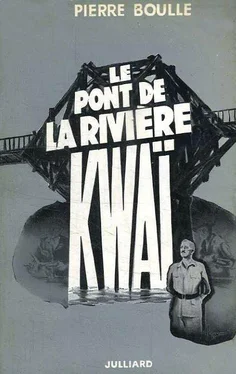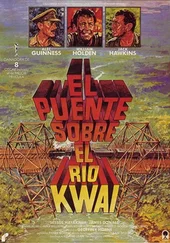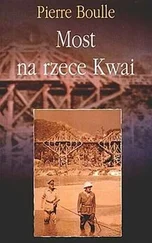Colonel Nicholson was fond of his men. At first he had backed Clipton up to the best of his ability so as to justify the size of the sick list in the eyes of the Japanese. He had anticipated Saito’s inevitable protests by demanding a greater effort from the men who were still fit.
But for some time now he had felt that Clipton was going too far. He openly suspected him of abusing his medical privileges and of showing excessive leniency by certifying prisoners who could still be of some use as unfit for duty. The work was due to be completed in a month; this was no time for slacking off. He had come to the hospital that morning to inspect it personally, to thrash the matter out with Clipton, and to put the M.O. on the right track—firmly, of course, but also with the courtesy which one had to show, after all, when approaching a staff officer on such a delicate issue.
“What about this chap, for instance?” he said, stopping to speak to one of the patients. “What’s wrong with you, my lad?”
He was walking between two rows of prisoners who lay on bamboo beds, either shivering with fever or in a state of coma, their cadaverous faces protruding from the threadbare blankets.
“Temperature of last night, sir. Malaria.”
“Right, I see,” said the Colonel, moving on. “And this man?”
“Jungle sores. I had to dig into his leg yesterday— with an ordinary knife; I haven’t any other instruments. He’s got a hole in him as large as a golf ball, sir.”
“So that was it,” muttered Colonel Nicholson. “I thought I heard someone shrieking in the night.”
“That was it. Four of his pals had to hold him down. I hope I’ll be able to save his leg, but it’s touch and go,” he added, lowering his voice. “Do you really want me to send him out to work, sir?”
“Don’t talk rot, Clipton. Of course I don’t. What you say goes. Let’s get this clear. I’m not trying to force sick and wounded men to work. But we must face this fact: we’ve got less than a month to finish the job we’re doing. It’ll require a superhuman effort, I know, but I can’t help that. Consequently, each time you take one of the men off work, you make it harder for everyone else. You ought to bear that in mind every moment of the day, do you understand? Even if a man’s not at the top of his form he can still make himself useful and help on light duties—the trimmings and finishing touches, for instance; the general wash and brush-up that Hughes will soon be organizing, you know.”
“I suppose you’re going to have the thing painted, sir?”
“Don’t even think of such a thing, Clipton,” said the Colonel testily. “The most we could do would be to give it a coating of lime—and a fine target that would make for the planes, wouldn’t it! You seem to forget there’s a war on!”
“You’re quite right, sir, there’s a war on.”
“No, there’ll be nothing fancy about it. I’m all against that. All we want is a decent, properly finished job. That’s what I came here to tell you, Clipton. You must make the men understand they’ve all got to pull their weight. This fellow, now…”
“A nasty arm wound, sir, which he got from hoisting beams for that bloody bridge of yours,” Clipton burst out. “I’ve got twenty others like him on my hands. Naturally, in their present state the wounds won’t heal and they get infected. I’ve got nothing to treat them with…”
“I wonder,” persisted Colonel Nicholson, pursuing a single train of thought and overlooking Clipton’s improper language, “I wonder if in a case like this fresh air and light duties wouldn’t do them more good than lying cooped up in this hut of yours. What do you think, Clipton? After all, it’s not our usual policy to send a man to the hospital just because he’s scratched his arm. If you stop to think for a moment, Clipton, I’m sure you’ll feel the same as I do.”
“Not our policy, sir! No, not our policy!”
He raised his arms in a gesture of impotent despair. The Colonel took him aside, away from the patients, into the anteroom which served as a surgery, and went on pleading his case, using every argument available to a commander who wants to persuade rather than give orders. Finally, since Clipton seemed far from convinced, he put forward his most cogent reason: if Clipton insisted on pursuing this course, the Japanese would take it on themselves to evacuate the hospital completely and would show no discrimination in the process.
“Saito has threatened to take drastic steps,” he explained.
That was a white lie. Having at last realized that violence had no result, Saito had now stopped using it, and, in his heart of hearts, was delighted to see the best installation on the whole line being built under his direction, Colonel Nicholson had indulged in this distortion of the truth, even though it pricked his conscience. He could not afford to disregard a single factor which might accelerate the completion of the bridge—this bridge representing the dauntless sort of spirit which never acknowledges defeat but always has some inner resource to draw on as proof of its invincibility, this bridge which needed only a few more yards before it would straddle the Kwai valley in a single unbroken line.
Faced with this threat, Clipton cursed the Colonel but was forced to yield. He discharged about a quarter of the patients, in spite of the terrible moral problem that confronted him each time he had to make a choice. In this way he sent back to work a crowd of limping cripples, walking wounded, and malaria cases still shaking with fever but capable of dragging themselves along.
They did not complain. The Colonel had the sort of faith which moves mountains, builds pyramids, cathedrals, or even bridges, and makes dying men go to work with a smile on their lips. They succumbed to his appeal that they should pull their weight. They went down to the river without a murmur. Some of the poor devils, with one arm out of action thanks to a dirty or slipshod dressing, seized the rope of the ram with their only good hand and tugged at it all together with what remained of their will and strength, putting all their reduced weight behind it, contributing the additional sacrifice of this painful effort to the sum total of suffering which was slowly bringing the River Kwai bridge to a successful conclusion.
With this fresh impetus the bridge was soon finished. All that remained now was what the Colonel called the “trimmings,” which would give the construction that “finished” look in which the practiced eye can at once recognize, in no matter what part of the world, the craftmanship of the European and the Anglo-Saxon sense of perfection.
A few weeks after Joyce’s expedition, Warden followed the same route as the lieutenant and, like him, reached the observation post after an exhausting climb. It was his turn now to lie flat on his face in the ferns and observe the Kwai bridge down below.
Warden was anything but romantic. At first he gave no more than a rapid glance, just sufficient to enable him to recognize with satisfaction the construction that Joyce had depicted and to confirm that it was now complete. There were four partisans with him. He told them he did not need them for the moment. They sat down in their favorite position, lit their water pipes, and watched him quietly get down to work.
He first set up his radio aerial and tuned in to several stations. One of these, an absolute boon in occupied territory, gave him a daily intelligence report on the forthcoming departure of the big convoy which was to inaugurate the Burma-Siam railway. The messages he received were encouraging: the orders still stood.
After that he arranged his sleeping bag and mosquito net as comfortably as possible, carefully laid out the contents of his toilet articles, then did the same for Shears, who was to join him on this hilltop. Warden was a man of foresight, older than Joyce and more levelheaded. He was also more experienced. He knew the jungle from the various expeditions he had been on during his prewar vacations. He knew how highly a white man values his toothbrush at certain times and how much longer he can carry on if properly installed and if fortified by a cup of tea in the morning. If they were hard-pressed after the attack, they would have to jettison these goods and chattels of the civilized world; they would no longer be needed. But they would have helped to keep them fighting fit up to the moment they went into action. Satisfied with his arrangements, he ate some food, slept for three hours, then went back to the observation post and tried to think of the best method of carrying out his mission.
Читать дальше











